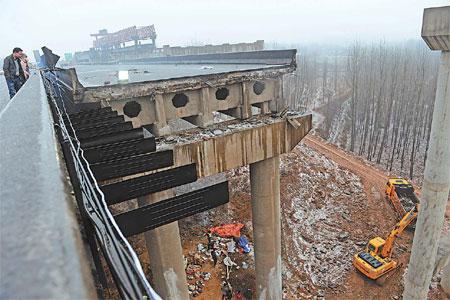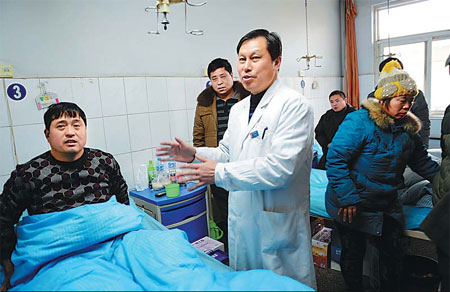Truck blast carnage raises safety fears
Updated: 2013-02-04 07:54
By Tang Yue and Xiang Mingchao in Sanmenxia, and He Na and Peng Yining in Beijing (China Daily)
|
||||||||
|
The broken expressway bridge in Sanmenxia, Henan province. A truck carrying fireworks exploded as it crossed the bridge on Friday, killing 10 people and injuring 11. Photos by Xiang Mingchao / China Daily |
|
Hou Quanlin, 43, survived the tragedy, with a mildly sprained ankle. But he lost his nephew in the incident. He is now being treated at Yima People's Hospital, one of four hospitals receiving survivors. |
Massive fireworks explosion casts shadow over festival, report Tang Yue and Xiang Mingchao in Sanmenxia, and He Na and Peng Yining in Beijing.
The first thing Zheng Tiancheng saw at the scene of the accident was a pale hand sticking out from the debris. Here, a wisp of black hair was visible in the rubble. There, a knee stuck out at an odd angle. Lower down in the valley, more than a dozen vehicles lay wrecked among the crushed concrete and twisted steel.
On Feb 1, an expressway bridge collapsed after a truck carrying fireworks exploded, and when Zheng arrived at the scene, the smell of death was overpowering.
"A woman had survived - she was whispering 'help me, help me' as we came closer," said the 52-year-old farmer who lives about a kilometer from the scene.
The woman's legs were trapped in the buckled doors of a minibus. Zheng and two other villagers levered the doors open and pulled the woman out of the wreckage.
"There was blood everywhere," said Zheng. "People were crawling out from the crashed cars, covered all over with blood."
Ten people died and 11 were injured in the accident at Sanmenxia city in central China's Henan province, according to a city spokesperson. The truck exploded as it crossed the bridge. The cause of the explosion is still not known, but the blast blew away an 80-meter-long section of the bridge, causing 25 vehicles to fall 30 meters.
Shattered windows
Zheng and villagers saved six people before the rescue team arrived. Zheng said he hadn't felt tired or frightened as he helped the injured, but when he arrived home later that day he found he could barely stand.
"I collapsed onto the floor, and my whole body was shaking," he said. "That was the most horrible scene I have ever seen."
He said the land shook when the explosion occurred. The intensity of the blast shattered all the windows in his house and also cracked several walls. The bridge was one of the busiest highways in the vicinity and Zheng said he used to drive across it almost every day.
"It could have been me under that bridge, crushed by tons of concrete and steel," he said. "The thought haunts me constantly."
Hou Quanlin, 43, who survived the tragedy, suffered a mildly sprained ankle. He and his 24-year-old nephew Hou Yanxin were driving a trailer across the bridge. The truck in front of them stopped abruptly, according to Hou, so he and his nephew got out of their vehicle to see what was going on.
It was at that moment that the firework-laden truck behind them exploded. The force of the blast blew Hou into the air and then threw him forward. When he got up and looked back, a huge section of the bridge, his trailer and his nephew, who had walked in the opposite direction after leaving their vehicle, were all gone.
"How can I face his parents?" muttered Hou to himself.
Receiving treatment at the nearby Yima People's Hospital, Hou was sucked into a vortex of guilt. He blamed himself, saying that he had failed to take care of his nephew. "How can I face his parents?" He repeated the sentence every few minutes, his eyes fixed on the ceiling.
"He barely eats or sleeps," said Hou Yanpu, Hou's son, who rushed to the hospital immediately after the accident, along with 10 other members of the family. "He doesn't talk much, except to blame himself endlessly."
Grief hung over the sickroom and everyone cried. Hou Yanxin was an only child and the father of a 3-year-old boy.
Nightmares
The injured and the bodies of the dead were sent to four nearby hospitals. Four of the 11 injured people were treated at Yima People's Hospital.
In one ward, truck driver Chen Gangsheng was in a coma, an oxygen mask clamped to his face. Under the white bed sheet that covered him, Chen had injuries to his lungs and liver, plus a number of broken ribs.
He sustained the injuries when his truck careered off the bridge. Chen was trapped in the driver's cabin but was pulled free by the driver of another truck. He had been directly behind Chen's truck, but was able to brake just before reaching the broken section of the bridge.
Feng Junke had been sitting next to Chen. He was thrown out of the cabin and died on the way to hospital.
Xiao Jianmin, 52, was luckier. The resident of Zhengzhou in Henan province was traveling with two friends. The three of them were trapped in their car after it fell off the bridge, but one of the men managed to scramble out and then helped Xiao. The two men were almost unscathed and with the help of villagers, pulled out their friend, who was more seriously injured.
Xiao has been tortured by nightmares since the accident, said his wife, Wang Mailian. He is unable to sleep and so spends the nights crying nonstop. Doctors have now suggested that he seek help from psychological counselors, she said.
Illegal transport
Officials said they are clear about the cause of the tragedy. "It's certain that the extensive illegal production and transportation (of fireworks) caused this major accident," said Wang Dexue, vice-director of the State Administration of Work Safety, at the site of the accident.
Hongsheng Fireworks Manufacturing Co, based in Pucheng county in neighboring Shaanxi province, manufactured the explosives illegally, packaged them improperly and signed a transport contract with a trucking company that did not have a license to handle hazardous materials, according to sources from the Pucheng County Information Office.
The local authorities have now shut down the factory and four company officials have been detained.
Wang Baixing, an explosives expert who joined the investigation into the blast, said the fireworks the truck was carrying were of the larger variety and had huge explosive potential. The truck had a maximum load of 5 metric tons, but was actually carrying more than 9 tons, and its explosive power was equivalent to 1 ton of TNT.
Accidents involving fireworks happen almost every year in China. The Spring Festival holiday is generally considered a high-incident period.
On March 28 last year, a truck full of fireworks collided with a cement tanker on a highway in Anhui province. The accident triggered an explosion that killed four people and injured more than a dozen.
Trucks loaded with fireworks can become "mobile bombs", according to experts.
The Safety Regulations for Fireworks, released by the State Council, China's cabinet, specifies that fireworks must be transported in vehicles specifically designed to carry hazardous materials, and that drivers must have many years experience in the field. They are also obliged to undergo annual checks and training supervised by the transport department. Moreover, companies wishing to transport fireworks must apply for a special permit.
However, the reality is far removed from the regulations.
China is the world's largest producer of fireworks and also one of the world's biggest consumers. Most of the leading manufacturers are situated at the border of Hunan and Jiangxi provinces. The annual output of the cities of Liuyang and Liling in Hunan, and Shangli county in Jiangxi, accounts for more than half of the global total.
Every year more than 20,000 fireworks made in the region are transported to areas across China.
The huge demand for transport for fireworks has stimulated the development of the local logistics industry, but seasonal demand has led to imbalances. During the peak sales season - from September to January - there is a lack of available transport.
Data from Liuyang Transport Bureau show that in the peak sales season in 2011, at least 1,400 vehicles were needed to meet the demand for transport, but the city's 10 businesses licensed to carry hazardous material, plus those in the surrounding areas, had just 760 vehicles legally allowed to carry dangerous materials. That resulted in a huge shortfall. This year the shortage is estimated to be around 600.
The high cost of specially designed vehicles has also led to lower safety levels in transportation. The cost of using one of the trucks to carry fireworks from Hunan province to the northeast of the country can be as much as 5,000 to 6,000 yuan ($802 - $963) more than normal vehicles. To lower costs, manufacturers will often opt for illegal channels of transportation.
China Central Television reported on Saturday that more than 60 percent of trucks used to carry fireworks on the Chinese mainland don't have a proper license or permit to transport hazardous materials. They lack protective containers and few of the drivers are aware that some fireworks contain chemicals that can combust even after contact with water.
"In addition, the manufacture of fireworks is a high-risk industry; many local governments would rather forego the profits the industry brings than introduce the factories to their region. Take Henan province for instance, although it's a large consumer market for fireworks, more than 95 percent of them are brought in from Hunan and Jiangxi provinces," said Liu Wenjun, the manager of a wholesale fireworks business in Henan.
"The contradiction of consumer demand and over-concentrated production inevitably leads to an increase in demand for long-distance transportation," he said.
According to Xinhua News Agency, every year at the approach of Spring Festival, many truckers gather at the border of Hunan and Jiangxi in search of trade. The local authorities want the business and therefore often choose to turn a blind eye to the problem.
Experts have long called for stricter laws and tougher punishments - they want to see technological innovation and updated logistics to lower the risks. Despite those calls, the problem remains.
"To effectively prevent the transportation of illegal fireworks will require the combined efforts of both logistics companies and the fireworks manufacturers. The only way to lower the risk is to establish joint investment and joint operation of the two parties," said Hu Wenyong, vice-director of Liuyang Transportation Management Department, quoted by Legal Weekly in December 2012.
At an emergency meeting held by the Ministry of Public Security in the wake of the blast, Vice-Minister Huang Ming ordered to make concrete arrangements to supervise the transportation of fireworks, firecrackers and other dangerous materials during the upcoming holiday.
Ma Shouguo contributed to this story.
Contact the reporters at tangyue@chinadaily.com.cn, hena@chinadaily.com.cn and pengyining@chinadaily.com.cn
(China Daily 02/04/2013 page8)

 In Photos: 7.0-magnitude quake hits Sichuan
In Photos: 7.0-magnitude quake hits Sichuan
 Li Na on Time cover, makes influential 100 list
Li Na on Time cover, makes influential 100 list
 FBI releases photos of 2 Boston bombings suspects
FBI releases photos of 2 Boston bombings suspects
 World's wackiest hairstyles
World's wackiest hairstyles
 Sandstorms strike Northwest China
Sandstorms strike Northwest China
 Never-seen photos of Madonna on display
Never-seen photos of Madonna on display
 H7N9 outbreak linked to waterfowl migration
H7N9 outbreak linked to waterfowl migration
 Dozens feared dead in Texas plant blast
Dozens feared dead in Texas plant blast
Most Viewed
Editor's Picks

|

|

|

|

|

|
Today's Top News
Live report: 7.0-magnitude quake hits Sichuan, heavy casualties feared
Boston suspect cornered on boat
Cross-talk artist helps to spread the word
'Green' awareness levels drop in Beijing
Palace Museum spruces up
First couple on Time's list of most influential
H7N9 flu transmission studied
Trading channels 'need to broaden'
US Weekly

|

|









